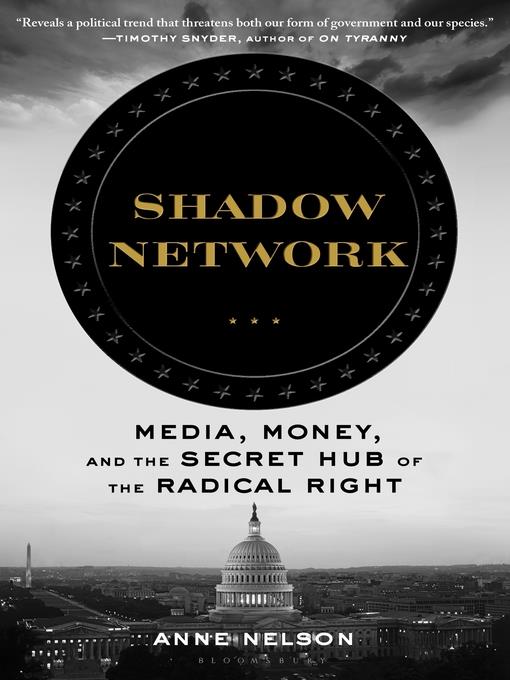
Shadow Network
Media, Money, and the Secret Hub of the Radical Right
کتاب های مرتبط
- اطلاعات
- نقد و بررسی
- دیدگاه کاربران
نقد و بررسی

Starred review from September 2, 2019
Award-winning journalist Nelson (Red Orchestra) presents an explosive, comprehensive account of the 30-year relationship between the conservative Council for National Policy, which promotes a stringent political ideology based on Southern Baptist morals, and the Republican Party. Nelson traces the group back to its founding in 1981 and subsequent endorsement of Ronald Reagan. With the Baptist influence, the GOP went from being a party of hawks and economic wonks to one preoccupied with social issues (an antiabortion, antigay agenda). The CNP quickly harnessed the power of religious radio shows, where Sean Hannity and Mike Pence began their careers, to further its conservative message, and has largely been funded by the DeVos family and the Koch brothers. Nelson outlines the CNP’s involvement in the election of every Republican president since Reagan; the failures of candidates, like Bob Dole, who didn’t get in line with its ideology; and the CNP’s transformation of Donald Trump from a crude, seemingly agnostic candidate to a spokesperson for socially conservative talking points (Trump, of course, returned the favor to the CNP by staffing his administration from their ranks, including Steve Bannon and Kellyanne Conway). Nelson meticulously and chronologically traces the connections between the CNP and a host of Republican leaders and organizations. This is an absolutely momentous piece of investigative journalism. Agent: Ethan Bassoff, Massie McQuilken.

September 1, 2019
The background machinations--digital, financial, religious, and otherwise--that have enabled the American far right to ascend and wield increasing political power that is disproportionate to their numbers. Nelson (International and Public Affairs/Columbia Univ.; Suzanne's Children: A Daring Rescue in Nazi Paris, 2017, etc.), a member of the Council on Foreign Relations, spent years researching this account of the 1981 formation and burgeoning influence of the Council for National Policy, an ultraconservative (and once-secretive) group that opposes abortion and gay marriage and that advances the cause of fundamentalist Christianity in all aspects of American life. The author's approach is chronological, analytical, and admonitory, as she fears the effects on our democracy of the deep divisions in our electorate, especially in the digital age. Nelson highlights some key moments in our history: the arrival of the Puritans, the Democrats' loss of the once-solid South (occasioned by their support of civil rights legislation), and the presidencies of Ronald Reagan, George H.W. Bush, and their successors of both parties. She describes the enormous power on public opinion of cable news and of the pervasive digital platforms. Most of all, the author follows the money, from the Koch brothers to the DeVos family and others (she does not neglect the left-wing money from George Soros). Countless millions have flowed from those sources to political organizations, individuals, and campaigns. Nelson observes that even though Barack Obama won two presidential elections, the opposition to him and his policies (especially health care) swelled among the CNP and their affiliates. She also deals substantially with Donald Trump, the moral compromises evangelicals employed to justify their support of him, and the purges of moderate Republicans from positions of authority. She recognizes, as well, how the internal battles of Democrats have been self-defeating. Though partisan, the text nonetheless raises significant red flags that should alarm everyone who believes in democracy.
COPYRIGHT(2019) Kirkus Reviews, ALL RIGHTS RESERVED.

























دیدگاه کاربران